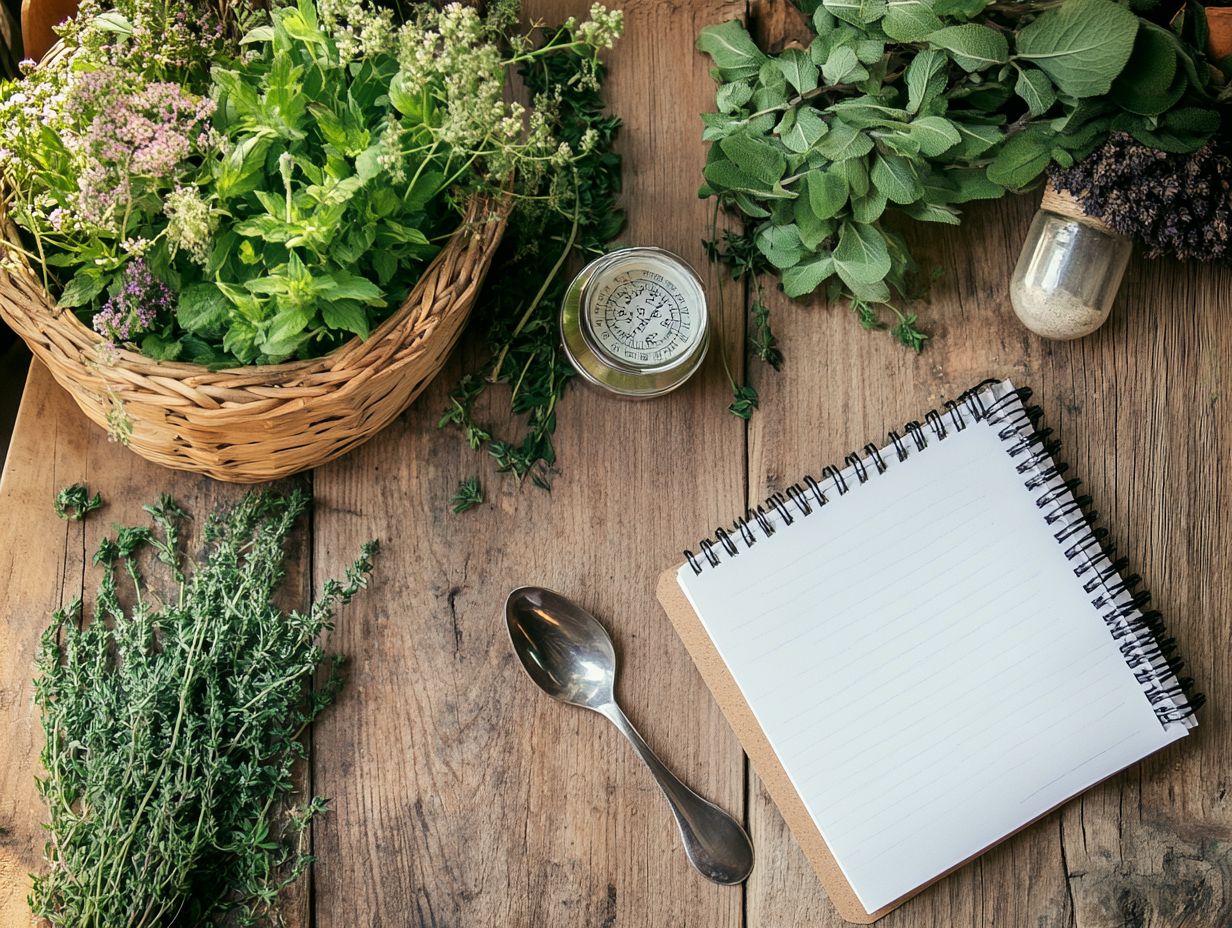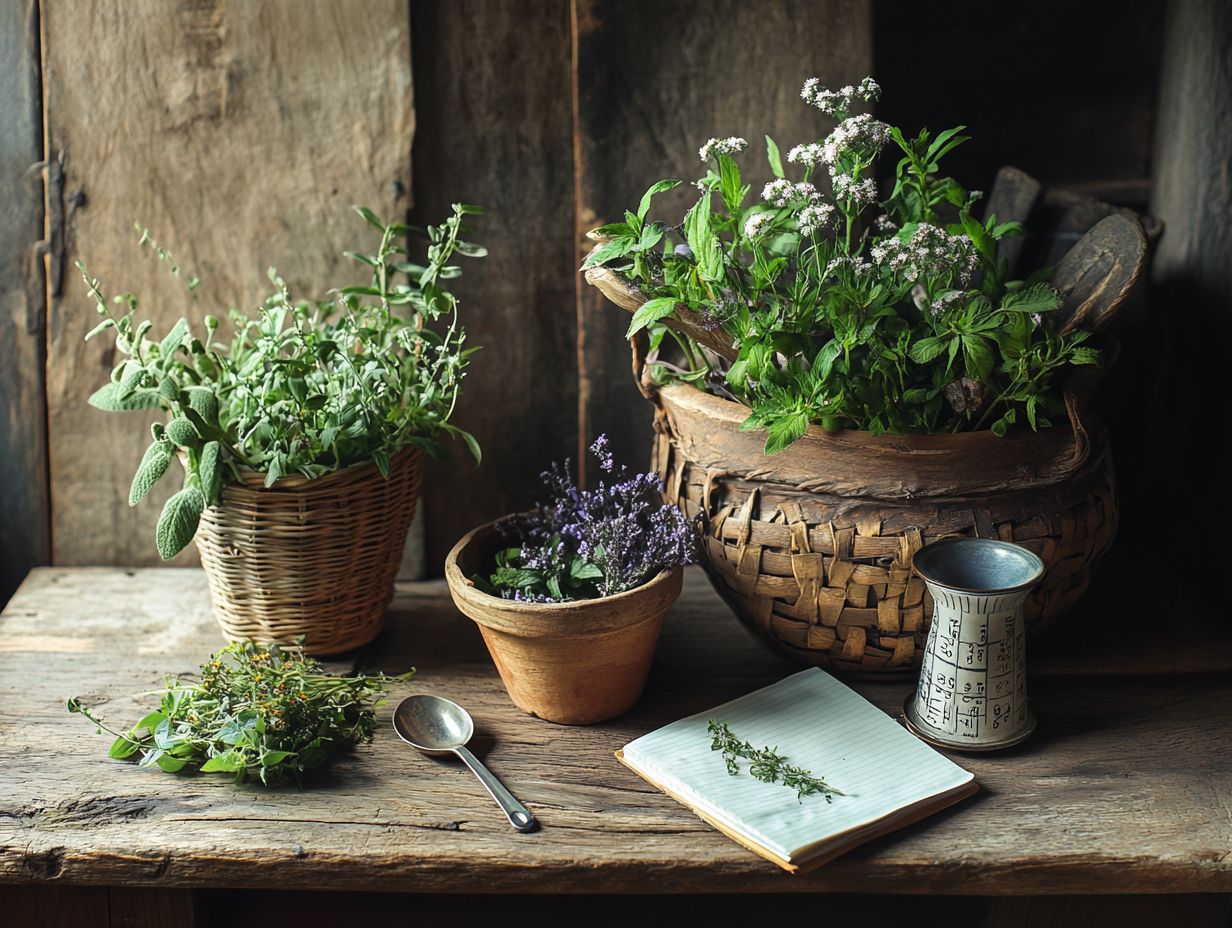Herbal Dosage Guidelines for Pregnant Women
Herbal remedies have surged in popularity, celebrated for their potential health benefits. However, they carry inherent risks, particularly during pregnancy.
This article delves into the advantages and pitfalls of herbal medicine. It underscores the critical importance of consulting with healthcare providers and understanding appropriate dosages.
You ll discover commonly used herbs along with their recommended dosages. Additionally, you will identify those to avoid during pregnancy due to potential dangers.
Arm yourself with the knowledge necessary to make informed choices about herbal remedies.
Contents
- Key Takeaways:
- Benefits and Risks of Herbal Remedies
- Factors to Consider Before Taking Herbal Medicine
- Commonly Used Herbs and Their Dosage Recommendations
- Herbal Remedies to Avoid During Pregnancy
- Frequently Asked Questions
- What are herbal dosage guidelines for pregnant women?
- Are herbal medicines safe for pregnant women?
- Which herbs are safe to take during pregnancy?
- Can I continue taking herbal supplements I was taking before pregnancy?
- How do I determine the safe amount of herbal medicine during pregnancy?
- Can herbal medicines treat pregnancy-related symptoms?
Key Takeaways:

- Always consult your healthcare provider before using herbal remedies during pregnancy to ensure safety for you and your baby.
- Get to know the right dosages for popular herbs like ginger and peppermint.
- Steer clear of harmful herbs during pregnancy to protect yourself and your baby!
Benefits and Risks of Herbal Remedies
Herbal remedies have a rich history, having been employed for centuries to tackle various health concerns. This includes common discomforts that often accompany pregnancy, such as nausea and vomiting during the first trimester.
As you explore alternative medicine options to ease these symptoms, it s essential to grasp the health benefits and risks associated with herbal products. Understanding safety levels and potential complications during pregnancy is paramount.
The regulation of herbal medicine varies widely, which can significantly influence the quality and potency of these remedies. These factors are crucial for ensuring maternal health.
Factors to Consider Before Taking Herbal Medicine
Before integrating herbal medicine into your wellness routine especially if you re pregnant consider several critical factors to ensure both safety and effectiveness.
Consulting with a knowledgeable healthcare provider or herbalist is essential, particularly for pregnancy-related issues. Not all herbal remedies are safe during this delicate time.
A thorough understanding of the risks associated with various herbs, along with the importance of proper education in the healthcare field, can significantly impact maternal health outcomes.
Consulting with a Healthcare Provider
Consulting with a healthcare provider is a vital step for you as a pregnant woman considering herbal medicine. Certain herbs can pose risks affecting both your health and that of your baby.
A knowledgeable healthcare professional can offer personalized advice, helping you identify safe herbal products while addressing any pregnancy-related concerns you may have.
These providers emphasize the importance of evidence-based education regarding herbal remedies. They can guide you in evaluating the safety profiles of various herbs, making it clear that not all natural products are appropriate during pregnancy.
Be sure to ask about potential interactions with prescribed medications and any existing health conditions. Seek clarity on the dosage and source of herbal products. For older adults, it’s especially important to follow guidelines like herbal remedies dosage tips. An open dialogue with your healthcare practitioners enables you to make informed choices, ensuring the well-being of both yourself and your unborn child.
Understanding Dosage Guidelines
Understanding dosage guidelines is essential when considering herbal medicine during pregnancy. Improper dosages can not only render these remedies ineffective but may also pose risks to maternal health.
By familiarizing yourself with the appropriate amounts of common herbs, you can enhance the efficacy of these natural supplements. For example, herbs like ginger and peppermint are frequently used to combat nausea.
However, exceeding the recommended dosages may lead to digestive issues or have unintended effects on the fetus. Similarly, while herbs such as chamomile and raspberry leaf can be beneficial in moderation, consuming them excessively may increase the risk of uterine contractions or other complications during pregnancy. It’s crucial to follow dosage recommendations for popular herbs to ensure safety.
This underscores the importance of consulting healthcare professionals before incorporating any herbal remedies into your routine. By doing so, you can ensure adherence to safe practices that protect both your well-being and that of your developing child.
Take charge of your health! Reach out to your healthcare provider today for personalized guidance on herbal remedies!
Commonly Used Herbs and Their Dosage Recommendations

Commonly used herbs like ginger, peppermint, chamomile, and red raspberry leaf are celebrated for their benefits, particularly for pregnant women seeking natural remedies for discomforts such as morning sickness. Understanding the right dosage for each herb is essential to maximize health benefits while minimizing risks.
Ginger
Ginger is widely recognized for its ability to ease nausea and vomiting, especially in the first trimester. Many pregnant women find it invaluable, but you should follow dosage guidelines for safety and effectiveness. Ginger works through active compounds like gingerol and shogaol, which help your stomach work better and reduce vomiting reflexes.
You can enjoy ginger in various forms such as ginger tea, capsules, or candied ginger. However, following dosage guidelines is crucial for your health. Research shows that a daily intake of up to 1,500 mg can be safe and effective for managing nausea during early pregnancy.
Peppermint
Peppermint is a favored remedy known for its soothing effects on nausea and digestive discomfort during pregnancy. Many expectant mothers find it refreshing, but understanding the proper dosage is vital for safety. This versatile herb has been used for centuries to relieve stomach issues and invigorate the mind.
Peppermint is available as tea, fresh leaves, or essential oil. Studies suggest that peppermint may help manage nausea, especially in the first trimester. It’s recommended to limit your intake to about one to two cups of peppermint tea daily for a gentle and effective option. For those interested in herbal remedies, learning how to create a safe herbal dosage plan can ensure safe consumption.
Echinacea
Echinacea is popular for its immune-supporting properties, making it a common choice for those looking to ward off illness. However, its safety during pregnancy warrants careful consideration, especially regarding dosage. This herb is often used to reduce the severity of colds and infections by stimulating various immune responses.
If you’re pregnant, it’s wise to approach echinacea with caution, as its effects on fetal development are not fully understood. Suggested dosages typically fall between 300 mg and 500 mg of standardized extract per day. Always check with your doctor before adding echinacea to your prenatal routine to ensure safety and effectiveness, and consider referring to 5 herbs with specific dosage recommendations for more guidance.
Chamomile
Chamomile is a gentle herb known for its calming properties, often used to promote relaxation and enhance sleep during pregnancy. While you may appreciate its soothing effects, it’s important to pay attention to dosage to avoid potential adverse reactions. This herb can help reduce anxiety and improve sleep quality.
Chamomile tea is typically enjoyed in doses of one to two cups per day, effectively easing stress and tension. However, pregnant women should be cautious, as excessive amounts may lead to uterine contractions. Always consult a healthcare provider before introducing new remedies and refer to balancing herbal remedies: dosage guidelines to ensure your safety and peace of mind.
Red Raspberry Leaf

Red raspberry leaf is celebrated for its potential benefits in supporting pregnancy and preparing your body for labor. Understanding the right dosage is crucial to ensure effectiveness while minimizing risks, such as uterine contractions.
This herbal remedy has been embraced by various cultures for centuries. It’s believed to tone the uterine muscles and facilitate smoother childbirth. Many expectant mothers drink red raspberry leaf tea for convenience. It s a gentle way to support reproductive health, packed with vitamins and minerals. The leaf can also help alleviate pregnancy-related discomforts.
Consult with your healthcare provider to determine the appropriate amounts. For more information, refer to herbal supplements: understanding recommended dosages. Excessive consumption can lead to complications. If you have certain medical conditions or are experiencing specific pregnancy issues, it’s wise to exercise caution when considering this herbal supplement.
Herbal Remedies to Avoid During Pregnancy
While many herbal remedies can provide potential benefits for pregnant women, it s crucial to recognize that certain herbs pose risks and should be avoided. Knowing which ones fall into the category of herbs to avoid is essential for safeguarding both maternal and fetal health.
Dangerous Herbs and Potential Risks
Certain herbs, including black cohosh, kava kava, and saw palmetto, can pose significant risks during pregnancy. These herbs may trigger serious complications, such as uterine contractions or other detrimental effects on maternal health. Are you aware of the risks? Knowing them can help you make safer choices!
Black cohosh, commonly used to ease menopause symptoms, has been associated with premature labor and complications that endanger both the mother and the developing fetus. Kava kava, known for its calming properties, can lead to liver damage and intense withdrawal symptoms, jeopardizing your overall well-being during this critical time. For those considering herbal remedies, it’s important to follow safe practices, including herbal preparations dosage tips for beginners. Saw palmetto may disrupt hormone levels, potentially impacting fetal development.
Documented cases highlight the need for vigilance. There have been reports of adverse events linked to these herbs, reinforcing the importance of steering clear of them throughout your pregnancy. Making informed choices and adhering to strict regulations regarding herbal medicines is essential for ensuring the safety of both you and your baby. It’s important to prioritize herbal product safety and understand herbal dosage for chronic conditions NOW for your health and your baby’s!
Watch this video for more insights on herbal remedies during pregnancy.
Frequently Asked Questions
What are herbal dosage guidelines for pregnant women?
Herbal dosage guidelines for pregnant women refer to the recommended amount of herbal medicine or supplements that should be taken during pregnancy to ensure safe and effective use.
Are herbal medicines safe for pregnant women?

Some herbal medicines can be safe for pregnant women, but it’s important to consult with a healthcare provider before taking any herbal supplements while pregnant. Some herbs may have potential side effects or interactions with other medications.
Which herbs are safe to take during pregnancy?
Some commonly used herbs that are considered safe for pregnant women include ginger, peppermint, and chamomile. However, it is best to consult with a healthcare provider before taking any herbal remedies during pregnancy to ensure safety. Green tea and ginger root are often recommended as safe options.
Can I continue taking herbal supplements I was taking before pregnancy?
Re-evaluate all medications and supplements, including herbal ones, before pregnancy. Some herbs may pose risks during this time, so it’s crucial to consult your healthcare provider.
How do I determine the safe amount of herbal medicine during pregnancy?
The safe amount of herbal medicine can vary based on the specific herb and your health. Check with your healthcare provider or a qualified herbalist for tailored guidance.
Some herbal medicines may help with common pregnancy symptoms like morning sickness, headaches, and back pain. Always consult your healthcare provider before trying any herbal remedies to ensure safety for both you and your baby.






